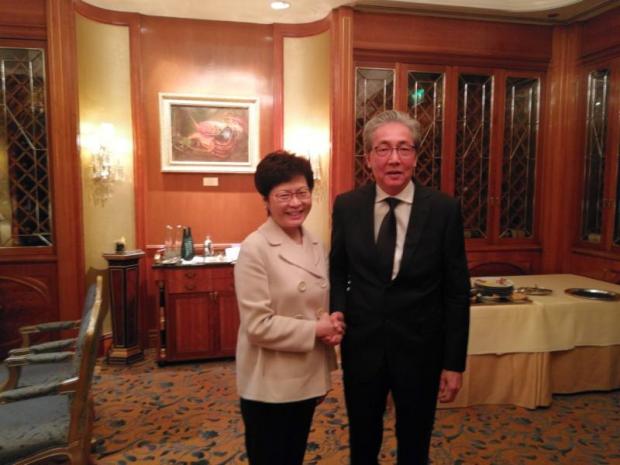
Deputy Prime Minister Somkid Jatusripitak has called for the establishment of a Hong Kong Economic and Trade Office (HKETO) in Thailand aimed at boosting economic ties and linking the country to China's new overseas investment strategy.
During a four-day visit to Hong Kong, Mr Somkid met Carrie Lam, who recently won a vote to become the next chief executive of the Hong Kong Special Administration Region from July. Thailand is the first country to have a minister meet Ms Lam while she forms her government.
Mr Somkid urged Ms Lam to consider establishing a HKETO in Thailand to facilitate economic cooperation between the kingdom and Hong Kong.
The deputy prime minister outlined Thailand's plans for the future to Ms Lam, saying Thailand is in the process of implementing national reform and the Thai government would like to see Hong Kong involved in the process, especially in terms of economic reform.
"Thailand aims to build strategic cooperation with China. Hong Kong spearheads taking Chinese investment overseas along China's One Belt One Road strategy on which Thailand is also situated," said Mr Somkid.
According to Mr Somkid, Thailand aims to strengthen ties with Hong Kong because China is using Hong Kong to bring Chinese investment overseas due to legal restrictions the mainland has in place.
The Chinese government supports domestic investors registering in Hong Kong and investing abroad through the One Belt One Road strategy which could sharply boost investment from Hong Kong to the region, including Thailand.
Mr Somkid told the Hong Kong chief executive-elect that that the two economies can create mutual benefits and Hong Kong can use Thailand as an investment gateway to enter Cambodia, Laos, Myanmar and Vietnam (CLMV) via the proposed establishment of a HKETO in Thailand.
He said the transport network can also enhance Hong Kong investment because the Chinese government aims to develop rail links from Thailand to Malaysia while the rail development can also link to CLMV.
HKETOs are Hong Kong trade offices outside the territory. There are 11 HKETOs outside mainland China and eight within China.
The privileges and immunities granted to HKETOs are the result of negotiations with host governments and these vary from office to office. In some cases, host governments such as the United Kingdom, Australia and Germany have granted certain privileges and immunities to HKETOs through dedicated domestic legislation.
At present, all 11 overseas HKETOs have been granted certain privileges and immunities by respective host governments to facilitate HKETOs to discharge their duties without intervention. Broadly speaking, the privileges and immunities enjoyed by HKETOs mainly include the inviolability of premises, official correspondence, archives and documents as well as the exemption of premises and representatives from taxation.
Mr Somkid also met Leung Chun-Ying, the chief executive of the Hong Kong Special Administration Region who will leave office this July and will later become honorary adviser to China.
Mr Leung spoke about China's Pan Pearl River Delta (PPRD) which involves cooperation among nine Chinese provincial regions together with Hong Kong and Macao. The plan is expected to support Chinese investment overseas.
Mr Somkid also asked Mr Leung to support the Free Trade Area development between Hong Kong and Asean.
Meanwhile, Suvit Maesincee, the Prime Minister's Office minister, who was part of Mr Somkid's delegation, told Hong Kong investors at an economic seminar to promote Thailand's Eastern Economic Corridor (EEC) yesterday that the Thai economy is expected to grow steadily and will hit 3.5-4% this year, which is still below its potential growth of 5%.
Thailand is in the process of economic reform which needs foreign investors to invest in mega-infrastructure projects.
Mr Suvit said national reform will be pushed under the new 2017 Constitution and the country's 20-year strategic plan as well as the government's Thailand 4.0 policy. Reforms are being made in various areas, ranging from infrastructure development, income disparity, public health, water management, health and education, he said.
Industry Minister Uttama Savanayana told Hong Kong investors that Thailand's EEC development will be the base for 10 targeted industries. These are next-generation cars; smart electronics; medical and wellness tourism; agriculture and biotechnology; food; robotics for industry; logistics and aviation; biofuel and biochemicals; digital industry; and medical services.
He said investment for EEC development in the next five years is expected to reach 1.5 trillion baht while the government's investment will account for 20%.
The rest of the investment is expected through the Public Private Partnership scheme which would provide opportunities for foreign investors, he said.
The Thai government is offering 15 years of corporate tax exemption for targeted industries and 17% personal income tax cuts for foreign specialists working in the EEC.